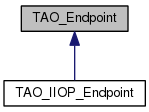|
TAO
2.0.8
|
|
TAO
2.0.8
|
Defines the Endpoint interface in the Pluggable Protocol framework. More...
#include <Endpoint.h>

Public Member Functions | |
| TAO_Endpoint (CORBA::ULong tag, CORBA::Short priority=TAO_INVALID_PRIORITY) | |
| Constructor. | |
| virtual | ~TAO_Endpoint (void) |
| Destructor. | |
| CORBA::ULong | tag (void) const |
| IOP protocol tag accessor. | |
| void | priority (CORBA::Short priority) |
priority_ attribute setter. | |
| CORBA::Short | priority (void) const |
priority_ attribute getter. | |
TAO_Endpoint Template Methods | |
| TAO_SYNCH_MUTEX | addr_lookup_lock_ |
| Lock for the address lookup. | |
| CORBA::ULong | hash_val_ |
| Cache the hash value. | |
| CORBA::ULong const | tag_ |
| CORBA::Short | priority_ |
| virtual CORBA::Boolean | is_equivalent (const TAO_Endpoint *other_endpoint)=0 |
| virtual TAO_Endpoint * | next (void)=0 |
| Endpoints can be linked in a list. | |
| virtual TAO_Endpoint * | next_filtered (TAO_ORB_Core *, TAO_Endpoint *root) |
| virtual int | addr_to_string (char *buffer, size_t length)=0 |
| Return a string representation for the address. | |
| virtual TAO_Endpoint * | duplicate (void)=0 |
| virtual CORBA::ULong | hash (void)=0 |
| Return a hash value for this object. | |
| TAO_Endpoint (const TAO_Endpoint &) | |
| Endpoints should not be copied. | |
| void | operator= (const TAO_Endpoint &) |
| Lock for the address lookup. | |
Defines the Endpoint interface in the Pluggable Protocol framework.
Lightweight encapsulation of addressing information for a single acceptor endpoint. In other words, Endpoint represents a single point of contact for the server, and is the smallest unit of addressing information necessary for a client to connect to a server. A Profile contains one or more Endpoints, i.e., knows of one or more ways to contact server(s).
| TAO_Endpoint::TAO_Endpoint | ( | CORBA::ULong | tag, |
| CORBA::Short | priority = TAO_INVALID_PRIORITY |
||
| ) |
Constructor.
| TAO_Endpoint::~TAO_Endpoint | ( | void | ) | [virtual] |
Destructor.
| TAO_Endpoint::TAO_Endpoint | ( | const TAO_Endpoint & | ) | [private] |
Endpoints should not be copied.
| virtual int TAO_Endpoint::addr_to_string | ( | char * | buffer, |
| size_t | length | ||
| ) | [pure virtual] |
Return a string representation for the address.
The purpose of this method is to provide a general interface to the underlying address object's addr_to_string method. This allows the protocol implementor to select the appropriate string format.
Implemented in TAO_IIOP_Endpoint.
| virtual TAO_Endpoint* TAO_Endpoint::duplicate | ( | void | ) | [pure virtual] |
This method returns a deep copy of the corresponding endpoints by allocating memory.
Implemented in TAO_IIOP_Endpoint.
| virtual CORBA::ULong TAO_Endpoint::hash | ( | void | ) | [pure virtual] |
Return a hash value for this object.
Implemented in TAO_IIOP_Endpoint.
| virtual CORBA::Boolean TAO_Endpoint::is_equivalent | ( | const TAO_Endpoint * | other_endpoint | ) | [pure virtual] |
Implemented in TAO_IIOP_Endpoint.
| virtual TAO_Endpoint* TAO_Endpoint::next | ( | void | ) | [pure virtual] |
Endpoints can be linked in a list.
Implemented in TAO_IIOP_Endpoint.
| TAO_Endpoint * TAO_Endpoint::next_filtered | ( | TAO_ORB_Core * | , |
| TAO_Endpoint * | root | ||
| ) | [virtual] |
Return the next endpoint in the list, but use protocol-specific filtering to constrain the value. The orb core is needed to supply any sort of filter arguments, and the root endpoint is needed in case the algorithm needs to rewind. If the supplied root is 0, then this is assumed to be the candidate next endpoint.
To use this, the caller starts off the change with root == 0. This is a bit of a violation in logic, a more correct implementation would accept this == 0 and a non-null root. To do iteration using next_filtered, do: for (TAO_Endpoint *ep = root_endpoint->next_filtered (orb_core, 0); ep != 0; ep = ep->next_filtered(orb_core, root_endpoint)) { }
Reimplemented in TAO_IIOP_Endpoint.
| void TAO_Endpoint::operator= | ( | const TAO_Endpoint & | ) | [private] |
Lock for the address lookup.
| void TAO_Endpoint::priority | ( | CORBA::Short | priority | ) |
priority_ attribute setter.
| CORBA::Short TAO_Endpoint::priority | ( | void | ) | const |
priority_ attribute getter.
| CORBA::ULong TAO_Endpoint::tag | ( | void | ) | const |
IOP protocol tag accessor.
TAO_SYNCH_MUTEX TAO_Endpoint::addr_lookup_lock_ [mutable, protected] |
Lock for the address lookup.
CORBA::ULong TAO_Endpoint::hash_val_ [protected] |
Cache the hash value.
CORBA::Short TAO_Endpoint::priority_ [protected] |
CORBA::ULong const TAO_Endpoint::tag_ [protected] |
IOP tag, identifying the protocol for which this endpoint contains addressing info.
 1.7.5.1
1.7.5.1